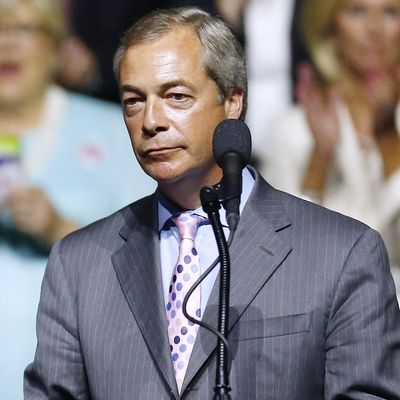
Donald Trump has filled his administration’s top posts with far-right extremists whom he selected on the basis of their their loyalty to Donald Trump — and he would really appreciate it if U.K. prime minister Theresa May would do the same with hers.
This is an extraordinary missive. Nigel Farage is a member of UKIP and an arch-critic of May’s Tory government. (Imagine if May publicly announced that “many people” wanted to see Harry Reid as America’s ambassador to Britain.)
Trump’s tweet is even more extraordinary for the fact that he had already embarrassed the U.K. government by speaking with nine other world leaders before taking a call from May. Then, when he and the British PM finally spoke, he declined to offer her any specific invitation to meet, saying instead, “If you travel to the U.S., you should let me know.”
May’s office quickly shot down Trump’s recommendation, noting, “There is no vacancy. We already have an excellent ambassador to the US.”
Britain’s political class was virtually unanimous in its antipathy to the president-elect’s brazen request. But there was one British politician who, in this age of myopic nationalism, still believes that foreign nations should be able to dictate the decisions of the U.K. government.
On Tuesday, Farage penned an op-ed for Breitbart — the far-right digital magazine that Trump’s chief strategist Steve Bannon used to run — in which he details his reaction to Trump’s audacious advocacy on his behalf.
Like a bolt from the blue Trump tweeted out that I would do a great job as the UK’s Ambassador to Washington.
I can still scarcely believe that he did that though speaking to a couple of his long time friends perhaps I am a little less surprised. They all say the same thing: that Trump is a very loyal man and supports those that stand by him.
It is called trust and it is how the whole world of business operates. Sadly, the cesspit that is career politics understands nothing of this. In their world the concept of trust is transitory.
This is a radically bizarre — and bizarrely radical — argument, even for a xenophobic “boozer” like Farage. He appears to be saying: Throughout the corporate world, people are rewarded primarily on the basis of their personal loyalty to powerful men — but, sadly, British politics still does not operate entirely on this authoritarian principle.
Farage goes on to bemoan the fact that the conservative government has not been purged of “Remainers” — or of those who dared to criticize the leader of a foreign country.
“The political revolution of 2016 now sees a new order in charge of Washington. In the United Kingdom the people have spoken but the players at the top have, I am afraid, stayed the same,” Farage writes. “Those who supported Remain now hold senior positions. Worse still, those who were openly abusive about Trump now pretend to be his friend.”
Farage is correct about that list bit. Like the vast majority of humans on planet Earth, much of the Conservative Party did not want to see Donald Trump become the American president. Even Trump’s fellow weird-haired, nihilistic demagogue Boris Johnson suggested the GOP nominee was “out of his mind,” and possessed “a quite stupefying ignorance.”
Since November 8, Johnson has realized that Trump is actually a “dealmaker,” who “believes firmly in values that I believe in too — freedom and democracy. As far as I understand he is in many aspects a liberal guy from New York.”
Johnson, the former mayor of London and current U.K. foreign minister, has plenty of good reasons to perform this about-face. Having rashly estranged itself from the European Union, Britain is more reliant on its “special relationship” with the U.S. than at any time in recent memory. Among other things, the nation hopes to strike up a new bilateral trade deal with the Trump administration.
Still, the British aren’t so dependent on America that they would allow Trump to select its ambassador to the U.S. Per the New York Times:
When the idea of using Mr. Farage’s friendship with Mr. Trump as a diplomatic tool was made earlier this month, the first minister of Wales, Carwyn Jones, said it would be like “giving a child a chain saw.”
Then again, giving a child a chain saw seems downright prudent, once you’ve given an emotionally volatile reality star the world’s largest nuclear arsenal.






























